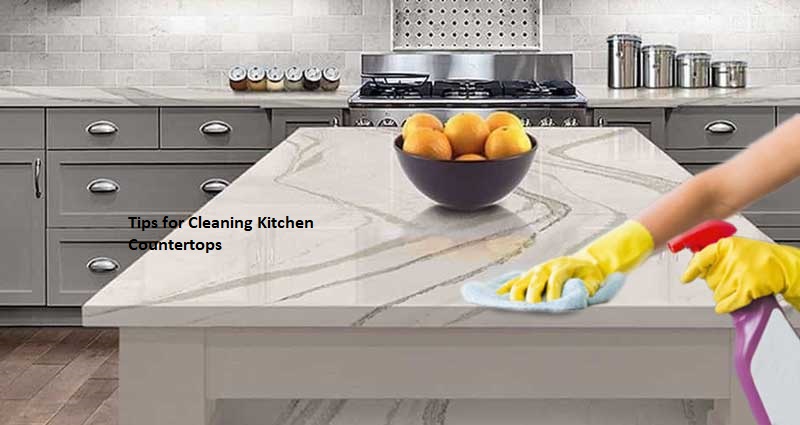Introduction
The cleanliness of your countertops is crucial to keeping your kitchen looking tidy and welcoming. In addition to being aesthetically beautiful, a clean kitchen keeps Tips for Cleaning Kitchen Countertops dangerous bacteria from spreading, protecting your family’s health. We’ll look at many methods in this post to maintain your kitchen countertops pristine, well-organized, and sanitary.
The Importance of Clean Countertops
A Healthier Home
A healthy house is invariably associated with a tidy kitchen. Because countertops are constantly in contact with food and other surfaces, they are frequently the main location where bacteria and other germs grow. You can guarantee your loved ones’ wellbeing by keeping them tidy.

Aesthetic Appeal
A clean countertop really improves the appearance Tips for Cleaning Kitchen Countertops of your kitchen as a whole. It’s similar to having a blank canvas on which to create, present, and serve your culinary masterpieces. A well-kept countertop improves your kitchen’s aesthetic appeal.
Tips for Cleaning Kitchen Countertops and Prolonged Lifespan
You can increase the longevity of your kitchen countertops with routine cleaning and upkeep. With proper maintenance, stains, scratches, and other types of damage are avoided that could require expensive replacements or repairs.
Choosing the Right Cleaning Supplies
Selecting the Appropriate Cleaners
The selection of cleaning materials is essential when Tips for Cleaning Kitchen Countertops it comes to cleaning kitchen counters. Steer clear of abrasive cleaners since they may harm the surface. To keep your countertops safe, use gentle, pH-neutral cleaners.
Natural Cleaning Solutions
Think about utilizing environmentally friendly and natural cleaning products. Without using harsh chemicals, you can clean and disinfect your counters using equal parts white vinegar and water or lemon juice.
Specialized Care
Different countertop materials require unique care. For example, granite, quartz, and marble countertops need gentle care, while laminate and stainless steel countertops have their own specific cleaning requirements.
Proper Cleaning Techniques
Regular Wiping
Make it a routine to clean your countertops following the preparation of each meal. This keeps spills, crumbs, and stains from building up.
Scrubbing and Stain Removal
Scrub the area gently using a soft cloth or sponge to remove stubborn stains and dirt. Steer clear of abrasive scrubbers as they may cause surface scratches.
Disinfection
To get rid of bacteria, clean your countertops often. Make sure you adhere to the manufacturer’s guidelines for proper disinfection procedures.
Organization and Prevention
Clutter-Free Countertops
A clutter-free countertop is easier to clean and provides more space for food preparation. Keep only essential items on display to maintain a tidy look.
Cutting Boards and Trivets
Use cutting boards and trivets to prevent direct contact between hot cookware and your countertops. This avoids potential heat damage.

Protective Sealants
Use a protective sealer on counters made of natural stone, such as granite and marble, to stop stains and damage.
Conclusion
At the center of a happy kitchen are your countertops, which should always be clean. You can maintain your kitchen worktops clean, tidy, and hygienic by using Tips for Cleaning Kitchen Countertops these tricks and strategies, which will enhance the appearance and usefulness of your cooking space.
FAQs
How often should I clean my kitchen countertops?
Regularly clean your countertops daily or after meal preparation to maintain cleanliness and hygiene.
What should I do if my countertops have stubborn stains?
Gently scrub the stained area with a soft cloth or sponge and an appropriate cleaner. Avoid abrasive scrubbers to prevent surface damage.
Can I use bleach to disinfect my countertops?
It’s best to follow the manufacturer’s recommendations for disinfection. Some countertops may be sensitive to bleach, so it’s essential to use the right disinfectant.



